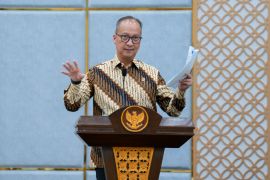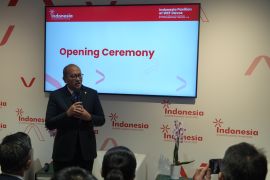SINGAPORE, Sept. 3, 2015 (Antara/PRNewswire) -- Nine out of 10 physicians in Asia-Pacific use some form of online search to aid clinical decision-making, with Google being the most popular and frequently used non-evidence based search engine. Yet searching for the "most trusted" and "most updated content" emerged as a priority for majority of those surveyed, highlighting a gap between what physicians are really looking for and the information sources they use to search, a survey amongst 210 Asia Pacific healthcare professionals reveals.
Click here to download infographic on findings.
The survey -- Clinical Search - An understanding of healthcare professionals' attitudes, needs and challenges -- conducted by Global Growth Markets (GGM) and commissioned by Elsevier, a world-leading provider of scientific, technical and medical information products and solutions, underlines the integral role of the internet and online search to the way healthcare decisions are made today, while highlighting the challenges physicians face in their quest for clinical information.
Some of those surveyed (11 percent) also indicated that there is "too much published information available," with 10 percent of the respondents saying they "need more training on how to search for clinically-relevant information."
Findings from the survey were presented today, at the 14th Hospital Management Asia (HMA) conference in Yangon, Myanmar, which was attended by more than 800 hospital and healthcare leaders across the region.
A study conducted by Google found that doctors perform an average of six professional searches a day during their course of work.1 Furthermore, it was estimated that by 2020, it will only take 73 days for medical knowledge to double in volume; knowledge is expanding faster than people can assimilate or apply.2
"As physicians, we are increasingly aware that to consistently provide our patients with the best care, we must not only know where to look for the information we need to solve complex medical questions, but more importantly, we must find information sources that we can trust as evidence-based, current, and reliable," said Dr. Peter Edelstein, M.D., FACS, FASCRS, Chief Medical Officer, Elsevier Clinical Solutions, who was also a plenary speaker at HMA. "Almost anyone can publish anything today on the internet. Thus we as doctors and healthcare professionals need to be careful and use only clinical search engines that quickly and easily deliver trusted and updated content to support our critical patient care-based clinical decisions.
The survey also found that 8 in 10 physicians indicated that having "instant access" to the latest reference content is "very" or "extremely important" in influencing their clinical decisions. However, the two most common challenges listed were limited subscriptions to clinical information services by hospitals or healthcare facilities and issues with Wi-Fi or network access.
Point of care where clinical information is used
The top reason cited for the search of clinical information was to "stay abreast of latest developments in their field," followed by "reference during treatment and surgery." Physicians also use online search to plan treatment therapy, diagnostic tests, ensure best care is delivered at the lowest cost, establish clinical standards of patient care, and to prepare for a patient interaction. The clinical specialties most reliant on search include cardiology, internal medicine, general surgery, neurology and oncology.
Survey results also showed that 58 percent of physicians prefer to access information from their computers while 14 percent still refer to printed sources of information. One in three physicians said they use a mobile device at the point of care, especially during patient consultation or treatment.
"Findings from this survey reveal that, regardless of which country and background doctors and healthcare professionals come from, their objectives and priorities with regards to clinical search is very much the same -- trusted content and quick access to the most recent information," said Pete Read, CEO, Global Growth Markets, who presented the survey findings at HMA together with Elsevier. "It would be valuable for healthcare providers to evaluate the effectiveness of their current clinical information services and tools, and see where they can direct their spending on information and technology to help fill the gap that doctors face when searching for clinical information."
|
1. |
Google, Manhattan Research, Screen to Script, The Doctor's Digital Path to Treatment. June 2012. Accessed at: https://ssl.gstatic.com/think/docs/the-doctors-digital-path-to-treatment_research-studies.pdf |
|
2. |
Densen P. Challenges and
Opportunities Facing Medical Education. Transactions of the American
Clinical and Climatological Association. 2011;122:48-58. Accessed at: http://www.ncbi.nlm.nih.gov/pmc/articles/PMC3116346/ |
About the survey
The Clinical Search - An understanding of healthcare professionals' attitudes, needs and challenges survey was conducted with 210 doctors and healthcare professionals from seven countries in Asia-Pacific, including Japan, Taiwan, Indonesia, Philippines, China, India and Australia. The survey was prepared by Global Growth Markets, a global healthcare market information provider, and funded by Elsevier.
About ClinicalKey
ClinicalKey provides evidence-based clinical answers drawn from the single largest body of clinical content available, including 600+ journals, 1,100+ books, drug information, guidelines, patient education and Medline. The Smart Search enables ClinicalKey to understand clinical terms and thus discover the most relevant medical content and find related content often missed by other search engines. ClinicalKey is optimized for any mobile device, making it more convenient to search and validate on-the-go. www.clinicalkey.com
About Elsevier
Elsevier is a world-leading provider of information solutions that enhance the performance of science, health, and technology professionals, empowering them to make better decisions, deliver better care, and sometimes make groundbreaking discoveries that advance the boundaries of knowledge and human progress. Elsevier provides web-based, digital solutions -- among them ScienceDirect, Scopus, Elsevier Research Intelligence and ClinicalKey -- and publishes more than 2,500 journals, including The Lancet and Cell, and more than 33,000 book titles, including a number of iconic reference works. Elsevier is part of RELX Group plc, a world-leading provider of information solutions for professional customers across industries. www.elsevier.com
Media Contacts:
Jason Chan
Director, Corporate Relations, Asia Pacific
Global Communications
Elsevier
+65 6349 0240
j.chan@elsevier.com
Jasmine Chng
Director, Singapore Healthcare Lead
Waggener Edstrom Worldwide
+65-6303-8474
jchng@waggeneredstrom.com
Logo - http://photos.prnasia.com/prnh/20150901/8521505679LOGO
Reporter: PR Wire
Editor: PR Wire
Copyright © ANTARA 2015











